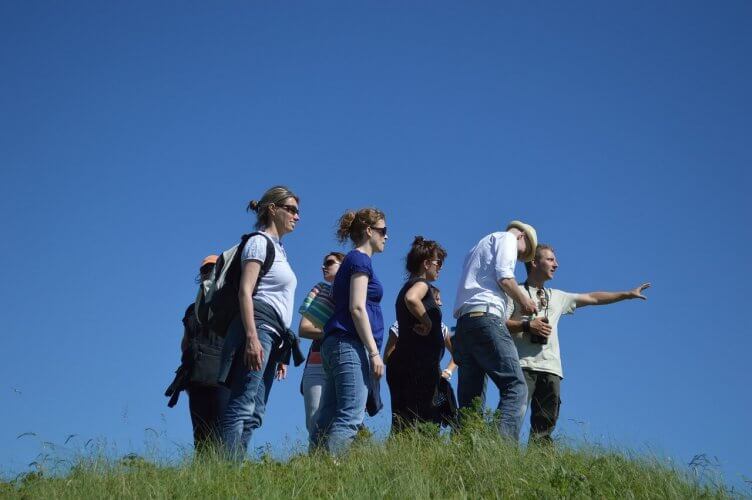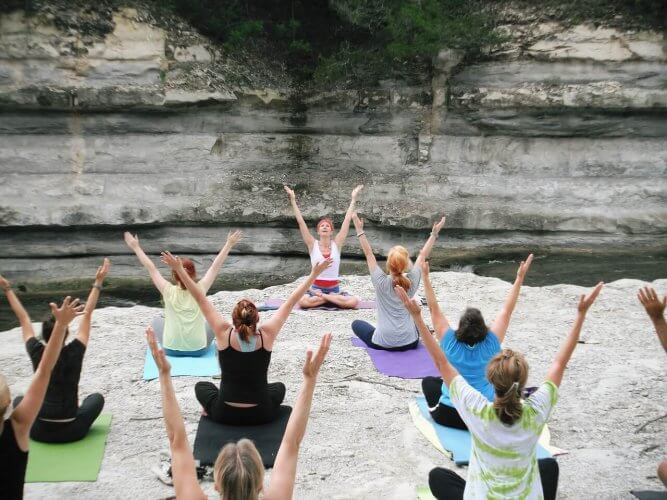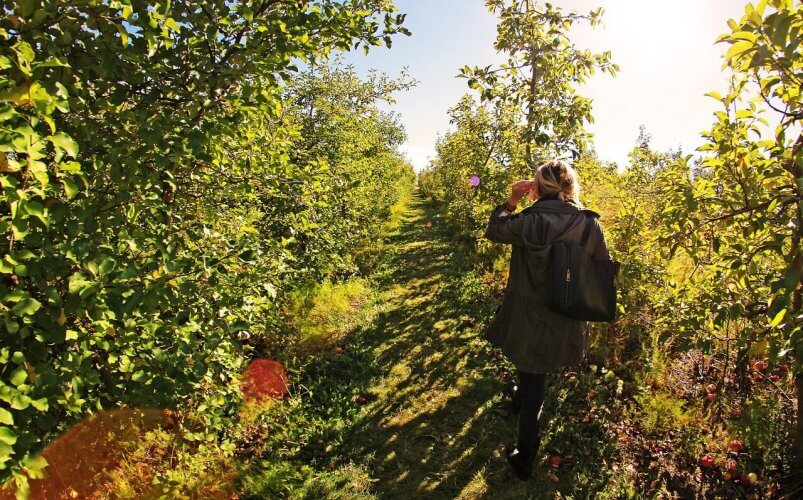20 Perfect Jobs To Fund Your Adventures
Do you dream of packing up a backpack and disappearing long-term? The fantasy of an extended trip to exotic places that pushes us completely out of our comfort zone is one that a lot of us have in the back of our minds.
There aren’t many of us, however, that are in a financial position to just take off and travel for months on end, no matter how cheap the destinations are.
Most of us will need an injection of cash to keep ourselves in beer and beaches. Once you’ve started travelling, then you’ll get the bug and you definitely won’t want to stop before you absolutely have to.
Luckily, these days it’s easier than ever to make money whilst you travel, and some people even turn working whilst travelling into their full-time lifestyle, living on the road for years on end.
Whatever your skills, there’s always something you can do to keep yourself solvent on the road. Trust me!

The World Is Your Oyster
When it comes to working and travelling, or the best jobs for people who love to travel, there is absolutely no one-size-fits-all. There are myriad ways of making money and what’s right for you will depend on your background and your existing skills.
It’s best to try and capitalise on any experience you already have rather than trying something entirely new, as you’ll generally earn more for your time and won’t have to start from the very bottom rung of the ladder.
On the other hand, you shouldn’t be afraid to think outside the box and try new things!
See if any of the job options below capture your imagination. I’ll start with travel jobs I’ve had first-hand experience of, before sharing some other ideas I’ve picked up along the way from people I’ve met online and in real life.
1. Au Pair
Good with kids? Au pairing could be for you. Au pairing is essentially going to live with a family to lend a hand with childcare. In exchange for a modest amount of pocket money per week, you’ll look after the kids for an agreed number of hours a day, or might be responsible for the school run, or the cooking…
The main point of this should be a cultural exchange. This idea is that their kids learn from being exposed to someone from a different culture. They will almost definitely want you to help their kids with their language skills. In English-speaking countries, this might not be the case, but in other countries, au pairs are often expected to speak English to their charges.
Food and board is covered, and you should have plenty of time off, so you can spend your pocket money on discovering the local area. It’s a great way to get a real insight into family life in another country.
It’s always a good idea to reach out to your network to see if anyone knows anyone who wants an au pair, but if you don’t have any contacts then have a browse for families on Au Pair World. That’s how I got my gigs!
My story: I au-paired in Barcelona and Bilbao (Spain) during two university summers to improve my Spanish, and then looked after kids on an apple farm in Western Australia.
2. Teaching English
If you’re a native English speaker, you’ve got a huge advantage when it comes to finding work on the road. You can always find people that are looking for English teachers, and they may or may not be asking for a specific qualification.
The CELTA or TESOL course is the main qualification people look for, seen as the basic requirement for most serious English-teaching jobs. It does involve a month-long extremely intensive course and a hefty chunk of money, but it also does pretty much guarantee you well-paid teaching work wherever you happen to rock up, so it’s totally worth investing.

People without qualifications (but a basic understanding of grammar!) will still probably come across plenty of work, just not as well-paid, unfortunately. If you’re willing to make an investment in time and money and want to teach and travel long-term, then definitely do a course before you leave.
As well as in-person teaching, you can also set yourself up as a virtual teacher. There are all kinds of platforms through which you can teach people anywhere in the world. All you need is a computer and an internet connection. That means you’re free to keep travelling as long as you can still stick to a schedule and keep track of time zones.
My story: I have a TESOL and taught conversation classes at a University in Mexico for eight months, and have done bits and bobs of online tutoring. Lots of people I know have had an amazing time teaching English in Asia and Spain.
3. Copywriting
If you’ve got a way with words, that could be your meal ticket. It might not pay that well to start with, but as you build up your experience you can start to earn respectable amounts if you’re willing to churn out blog posts on random topics. When I first started out I was writing about everything from concrete to pillows to botox.
As well as articles, you could write people’s website copy, product descriptions… everyone is in need of well-written words.
This isn’t something that you can start supporting yourself with immediately, as you’ll need to hone your skills and slowly build up your client base, so it’s best to start whilst you’re still at home/have another form of income.
There are lots of sites out there where you can find jobs listed, and they’re good places to start even though they do charge a hefty commission. They’ve all got their flaws, but I found Upwork to be the best place for me when I was starting out.
My story: This is what I’m doing right now, along with translating. I’ve been going for just under three years and it’s now my full-time job, allowing me to live a wonderful life in the south of Spain.
4. Blogging/Vlogging
As well as writing content for other people, a successful blog of your own can be a good source of remote, and sometimes passive, income.
But don’t be fooled, however glamorous the blogger lifestyle might look, it’s a lot of work, and can take years to build up so it’s profitable. Income comes from affiliate links, advertising, etc., but managing it all takes a huge amount of skill.
You’ll need serious commitment and determination, and be willing to work at it for a long time before you start to see any money from it.
If you’re a traveller then a travel blog might make sense, but there’s also food, fashion, lifestyle… The blogosphere is pretty overcrowded these days, so you’ll have to be doing something a bit different to stand out and gain a following.
The vlogging industry is ever-growing too, and if you get it right then you can make a pretty healthy living as a travelling Youtuber.
If you’ve got the determination, then you can make it happen!

5. Web Designing, Graphic Designing, Translation, Digital Market, Virtual Assistant…
It’s not just writers that get to have all the fun. There are jobs that only require a laptop and a Wi-Fi connection, and you can do any of them from a beach anywhere in the world if you’re organised enough!
I work as a translator a well as a writer, and there are countless people out there making the most of their skills to live the nomadic life.
Is your existing job something that you could do remotely? As these all require training and studies, you’ll have to be willing to play the long game for this one if you don’t already have the skills.
If you’re looking for a career change that could allow you to be nomadic down the lie, consider your options carefully.
My story: Alongside my freelance writing, I also translate from Portuguese and Spanish to English, having studied languages at university. It makes up about half of my workload.
6. Fruit Picking
An essential experience for any backpacker worth their salt, especially if you’re traveling down under. You can earn surprising amounts of money by picking fruit or vegetables if you turn up at the right time of year.
You’ll need to be physically fit and willing to work hard and efficiently in order to make the most money in the shortest amount of time, as some farms will pay by weight rather than by the hour.
My story: I picked apples for two months on a farm in Western Australia (whilst also working part-time as their au pair), and earnt enough to fund three more months of travelling, included a month in Bali.
7. Bar Work
Wherever there are tourists, there is bar work. Experience is a definite bonus here, and the job doesn’t vary much from country to country! Depending on where you want to find work, being familiar with the language is a big plus. It’ll make it easier to find a job, and then make your job an awful lot easier!
The seasonal nature of hospitality work means you can generally easily pick up a job for a couple of weeks in one place and then move on, without being tied to a contract. Bear in mind that this kind of work is sometimes paid under the table.
8. Hostel Work
Another great temporary gig, there are always hostels on the lookout for people to man the desk or clean the dorms, or work on the bar, or do all three.
Whilst this is normally only in exchange for food and board, if you stay long term then most hostels will offer paid positions too. Just make sure you don’t spend ALL your money going out partying with the new friends that will turn up every day!
9. Tour Guide/Rep

Where there are tourists, there’s always a need for tour guides. You’ll need to be good with people and probably good with languages too.
There are lots of options here, from guiding people around a historical landmark to being a rep in a Mediterranean resort over the summer, to working for one of the big overland tour companies and guiding six-month long trips around whole continents.
A big thing these days are free walking tours, which can be found in most cities. They generally last for about two hours and guides rely on tips, but can do pretty well out of large tour groups.
Example: My cousin has driven truckloads of tourists around South America for the past two years for Dragoman and Oasis Overland.
10. Ski Season
Are you a bit of a snow bunny? Are your skiing skills good enough to be an instructor, could you operate a ski lift, or would you like to work as a housekeeper/chef in a chalet? Immerse yourself in mountain life for a whole winter by signing up for a ski season.
There are lots of different jobs you can get in ski resorts, but most will be fixed term between November or December and Easter. Expect to work hard, ski hard, and party hard.
Bear in mind that not just anyone can teach skiing or snowboarding – you’ll need to take a pretty expensive intensive course to get the relevant qualifications before you can get work.
The slopes of Europe, North America and Japan are the most popular spots for people to spend a ski season. The lucky ones might even get themselves a gig somewhere in the southern hemisphere once the snow has gone, and live their lives in an eternal winter.
On the other hand, some thrill seekers swap snowboards for surfboards in the summer and spend their time teaching people how to ride the waves in some exotic location until the next winter rolls around.
11. Freelance Fitness Instructor
It’s not just people that work online that get to have all the fun. If you’re a fitness instructor, you could travel and earn money by putting on classes in the places you visit.
You could offer dance, Zumba, yoga, or work as a personal trainer, but you do need plenty of experience.

You can make deals with gyms or hostels to use their spaces. Hostels will love having something a bit different to offer their guests to entice them in, and you get to keep the profits!
12. Sports Instructor
Ski instruction isn’t the only option for you if you’ve got sports skills you can impart. There are plenty of options in warmer climes too. Think surfing, scuba diving, climbing, sailing, canoeing… If it’s your passion, then it won’t even feel like work.
You’ll need to get yourself the relevant qualifications before you can find work, but it’ll be an investment you’ll never regret, and one that could take you a very long way, literally.
My Story: I worked as a tubing instructor for ten months in Bonito, Brazil.
13. Massage Therapist
People aren’t just after yoga classes or adventure sports on their travels. Weary travellers will often happily part with a bit of cash to soothe their sore shoulders after lugging around their heavy backpacks for weeks on end.
Find yourself a job with a local company when you arrive somewhere, or do your own thing. As with fitness instruction, printing out fliers is a great idea to drum up business on the beach.
Again, this is something you’ll need to have the relevant qualifications for, as it’s not a skill you can pick up overnight.
14. Busking

Are you musical? Take your guitar, violin, or whatever you work your magic with on your trip with you and busk on street corners.
You can make a surprising amount of money if you pick the right spot! Just check in advance when you arrive in a new city as to whether you’ll need a permit to be able to play.
15. Work on a Cruise Ship/Yacht
These jobs are demanding and generally don’t pay all that much for the amount of work expected, but working on a large cruise ship or a superyacht headed for the Caribbean is a wonderful way to see the seven seas.
Chefs are paid well on boats, but you can also work as an engineer, a cleaner, or entertaining the crowds on cruise ships. As you’re normally stuck on the boat and food and board are included, then you’re not likely to spend much of the money you earn.
It’s intense, as you’ll spend all your time with your work colleagues, but if it sounds appealing to you then why not spend a few years travelling the oceans blue?
16. Professional Chef
A yacht isn’t the only place you can find a job as a chef. There are restaurants, cafes, food trucks and hotels pretty much everywhere who are often looking for a pair of helping hands.
Prior experience is key if you want to be doing anything in a restaurant other than washing the dishes.
You’ll also often see backpackers informally selling food they’ve whipped up in their hostel kitchen to hungry travellers on the beach, although be careful you’re not treading on anyone’s toes here, or breaking any laws.
17. Selling Your Work
Handy with macramé? There are plenty of backpackers who pay their way by selling their creations. Jewellery is extremely popular everywhere, but you could also sell paintings, leather work, clothes…
As long as you can get the raw materials cheaply, turn them out quickly and find willing customers, this is a great way to earn money wherever you go.
It’s always worth setting up camp somewhere busy during the high tourist season and earning enough to fund the next leg of your travels. Again, street selling is often strictly controlled, so investigate whether there are any local fairs you could set up at to keep things above board.
18. Photographer

The travel photography market is a saturated one, and becoming successful takes years of work, but if you’ve got the dedication and skill this could take you a long way.
Selling your images to publications or putting them on stock photo sites earns you money, and if you stay somewhere for an extended period then offering photography-based guided tours could also be a great source of income.
19. Flight Attendant
It might not be as glamorous as it looks, but there’s probably no better way of being paid to travel constantly. The training is tough, but the lifestyle is wonderful for some, with parties all over the world and hugely discounted airline tickets for you and your family.
This won’t be the case for those who just fly short haul, for example within Europe, but if you work for a long haul airline you’ll enjoy a few days of layover in exotic places now and again, and have your fellow attendants to enjoy them with.
Language skills are a huge plus if you want to get a job with certain airlines.
20. Working Holiday Visa
There are certain countries that will offer young people a year or more of a working holiday visa, meaning you can pick up work in just about anything whilst you’re there, no need for remote work or accepting cash in hand.

There are always limits on exactly how long you can work for, but people often head for Australia, New Zealand, Canada, France, and Ireland.
Earning money whilst you’re there can make somewhere like Australia a far more affordable destination than it would be otherwise, as you’re earning dollars as well as spending them.
And That’s Not All…
This is by no means an exhaustive list, but it should have given you a bit of inspiration for ways you can fund a long-term trip, get under the skin of a new culture or turn full-time travel into your reality.
Think about the special skills you have to offer, think outside the box a bit for creative ways to earn a few pennies and, most of all, enjoy the adventure!